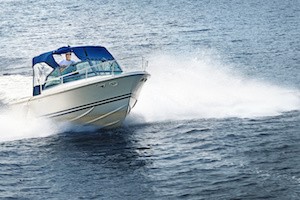 Owning a boat may mean spending many fun-filled days on the water; however when it comes to finding the right type of boat insurance, the waters can get rough. What most people don’t realize is that their N.C. homeowners policy does not provide the type of specialty insurance you need for your boat, whether it is a powerboat, fishing boat, or houseboat, to name a few.
Owning a boat may mean spending many fun-filled days on the water; however when it comes to finding the right type of boat insurance, the waters can get rough. What most people don’t realize is that their N.C. homeowners policy does not provide the type of specialty insurance you need for your boat, whether it is a powerboat, fishing boat, or houseboat, to name a few.
While your N.C. homeowners policy may cover your boat while it is stored on your property, it will not provide coverage for your boat on the water, leaving you exposed to many risks that could sink you financially! If you do suffer a covered loss to your boat, you need to know how your boat coverage applies to the value of the boat, which may be the biggest problem with boat insurance.
Boating Isn’t Always Fun and Games
It is a holiday weekend and you have plans to take a few friends out on the waters in your boat. Everything is going smoothly until you hit a submerged object you never saw and suddenly everything comes to a screeching halt! Your boat has suffered extensive damage and now you will have to settle up for the damages. Most people aren’t aware that their boat may only be covered for the actual cash value, which takes into account depreciation when making the claim payout. Do you know how your boat is covered under your boat owners insurance policy?
Different Valuation Methods You Need to Know
Boat owners insurance pays for losses that occur based on different valuation methods. These methods help to determine the payout level for the coverage as well as determine the cost of the policy. The valuation method that uses a lower amount to establish the value of a loss will be much less costly than a policy that has an established/agreed amount of loss. Below are the different types of valuation methods used:
Agreed Value Coverage- If your boat is totaled, this type of coverage provides a settlement of an “agreed” value between you and the insurance company (established at the policy inception) on the value of the boat. For example, if you agreed the value is $20,000 then that is what the claim payout would be at the settlement, should you suffer a covered loss. This type of an agreed value policy would have a higher premium than that of an actual cash value policy.
Actual Cash Value- With this type of valuation method, your settlement would be based on the replacement cost of your boat less any depreciated value. This type of plan is less costly than the others and may be preferred by many just because of the cost value or the age of their boat. For example, if your boat is 10 years old and it is totaled, you would be compensated for the cost to replace your boat minus 10 years of factored depreciation.
Replacement Cost Coverage- With replacement cost coverage, you would receive a claim payout of a brand new version of your boat that you had before the loss, if it is rendered a total loss. For example, if you purchased your boat for $20,000 and you total it a year later, you would receive $20,000 or the cost of that exact boat today, even if it is $20,000 plus. Keep in mind, though, that this type of valuation settlement is going to be more costly than the actual cash value settlement option.
Specialized Insurance for Your Boat is the Answer to Your Questions
Deciding on which type of valuation process to use is entirely up to you and your specific boating needs. Our office is here to assist you with all of your boating insurance questions while understanding each situation is unique. We can build a policy that makes sense for you, your crew, and your boat. Call our office TODAY at 866-839-3335 or visit our website www.paramountinsurance.net to find the boating insurance coverage that is right for YOU!

 Tom's Blog
Tom's Blog



